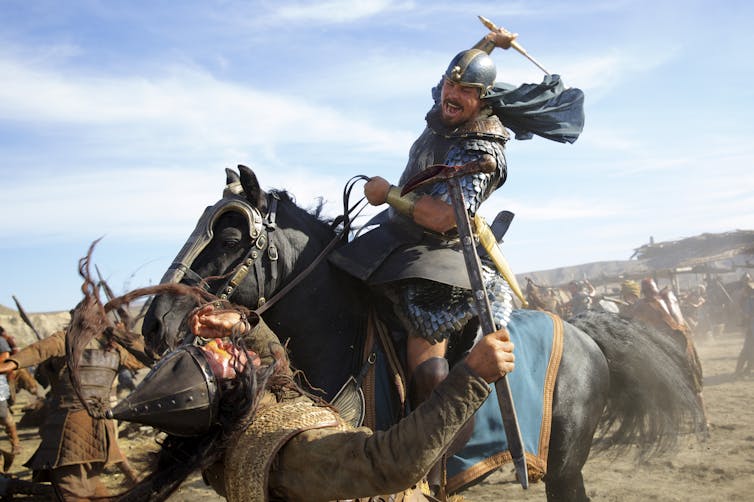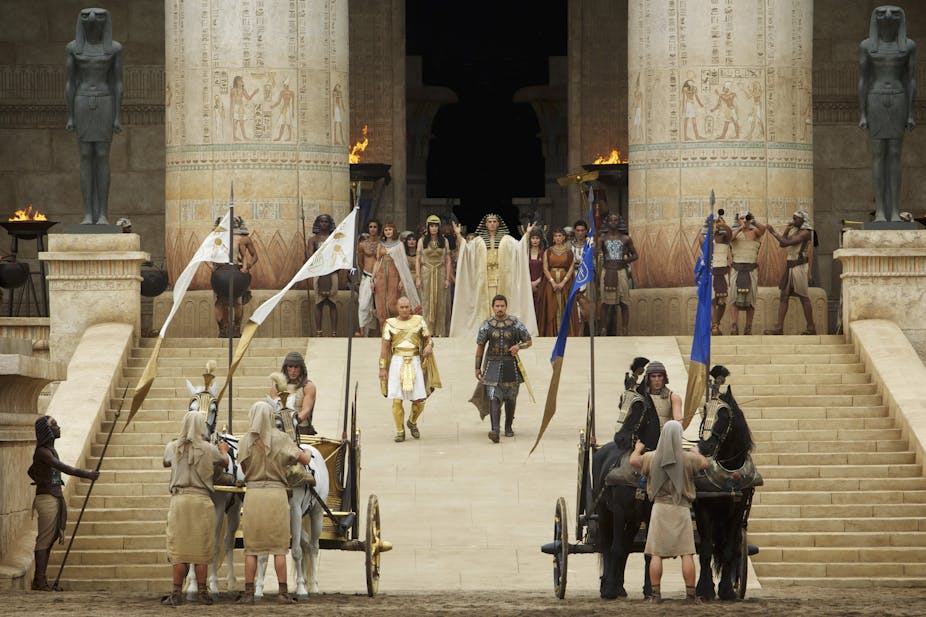“It’s not even that good a story,” quips Moses during Exodus: Gods and Kings, the latest biblical blockbuster to assault our cinema screens. I think Moses was being rather harsh on himself there; it’s a cracking story.
Part sword and sandals epic, part high camp with an equal measure of tragedy and more than a touch of naff, Exodus definitely isn’t boring.
Moses is a blade-wielding general who tones down his hyper masculinity with a heavy handed application of bronzer. I’ve commented on the cast’s tantastic make up before so I won’t go into again, but let’s just say that during the screening I didn’t know whether I was being given dark glasses for the 3D or to shield my eyes from the fluorescent orange of the complexions.
Moses is close to his father, Pharaoh Seti, and his half-brother Rameses, who he mistakenly believes are his blood relatives. The audience, even without any prior knowledge of the biblical text, could have guessed there was twist in the tale here: Moses is the only one of the trio who doesn’t rock guy liner and more gold lamé than the entire cast of Strictly. Rameses, in particular, is blingin’.
We see from an early stage that Moses is a thinker in comparison to his immature brother, who is prone to tantrums and foolhardiness. For example, in the early scenes, we witness Moses saving Rameses’s life in battle, while, once back on homeground, Rameses reacts to a telling off from his dad by sulking off to milk pythons bare handed and bare chested. Don’t scoff, I think we’ve all been there.

Straight from the 50s
There’s been plenty of commentary recently on the racial dynamics of the casting for the film and director Ridley Scott’s unfortunate dismissive response, but the lack of racial diversity in the main cast really is striking. The press reports and discussions just can’t convey the visual effect of seeing a white (mega)star cast supported by actors of colour, often voiceless and left standing around acting as human air conditioners, cooling down the main characters with giant feather fans. Unfortunately the epic biblical style isn’t all that Scott has carried through from the 1950s.
When Pharaoh Seti dies – still maintaining a strong kohl cat flick – Moses has to pay the price for his brother’s jealousy of his close relationship to their father. Israelite servants leak the news that Moses’ bloodline doesn’t descend from Egyptian royalty and in fury, Rameses exiles Moses to the desert. Not so bad after all, because there he cops off with a lovely lass, Zipporah, whose eye make up almost rivals that of the Egyptian monarchy. Despite food being in short supply, stocks of Rimmel Scandaleyes, it seems, were plentiful.
Moses is now a shepherd in love and the two have a little boy and all is sweetness and light. Until, that is, he has an accident while tending his flock in the mountains and sustains a serious head injury. Serious enough that he witnesses a burning bush and has a chat with God.

God, the brat
Now, this is the really interesting bit in the film. Scott chooses to abandon the booming divine voice of The Ten Commandments in favour of portraying God as a petulant pre-teen. I don’t know how to be sensitive here so I won’t try: Scott’s God is a little brat. Like Pharaoh Ramses, God throws tantrums, raises his voice, and acts out during moments of pique. He’s also utterly merciless and self-serving.
Moses frequently tries to reason with Him, but to no avail. God has absolutely no concerns about inflicting a whole race of Egyptians with The Plagues, not only the privileged aristocrats who maintain the social status that so infuriates God, but the ordinary, poor Egyptians we witness sobbing over dead cattle and the corpses of their sons. Like Aronofsky’s Noah, Scott’s Exodus doesn’t shrink from showing us the horrors wrought by God’s acts and the suffering of innocents. The Plagues are spectacularly CGId to life, with rivers of blood, frog and fly infestation and…er…alligators, impressively rendered, perhaps unsurprisingly given the enormous special effects budget.
The most affecting scene is, of course, the deaths of the firstborn. A chillingly silent episode when the audience witnesses the death of child upon child, breaths extinguished with barely a sound as a shadow passes over them. The silence is broken by screams, cries and sobs as parents find their children’s corpses; the lines between good and evil well and truly blurred.
Beach hero
Thrusting the tiny lifeless body of his infant son at Moses, Pharaoh Ramese expels the Israelites from Egypt and the exodus begins. Moses leads his people to freedom and then, seemingly to a dead end: the Red Sea. They all camp out on the beach as our hero, wielding his trusty sword rather than a rod, worries that God has abandoned him and his people.
The Pharaoh, galvanised by grief and hatred, is hot on the Israelites’ heels and is almost upon them when, but what do you know, the Red Sea begins to shift. Not a parting down the middle a la Cecile De Mille, but a tremendously convenient shifting of the tide, so that the Israelites cross (not without some difficulty) and the Egyptians, and Moses, are left to be enveloped by the crashing waves as the sea returns to normal. Once again, here’s a scene reminiscent of Aronofsky’s Noah when we see hundreds of corpses suspended in the water; Egyptian men forced into death by a tyrannous leader.
Moses returns to Zipporah, who barely raises a beautifully groomed eyebrow when she discovers that her errant husband has brought scores of Israelites with him. Mealtimes are going to become strategic events in the Moses household.
In the final scene Scott cuts to a contented looking geriatric Moses, riding with the stone tablets on which the Ten Commandments are written. It looks like Moses has calmed down on the instant bronze in his old age, but I couldn’t help feeling, after sitting through over two hours of biblical drama, that the slightly naff ending was a bit of a cop out. At least it looked as if the God straight out of Italia Conti was making an exit at that point. Like Moses, I’m thankful for small mercies.

